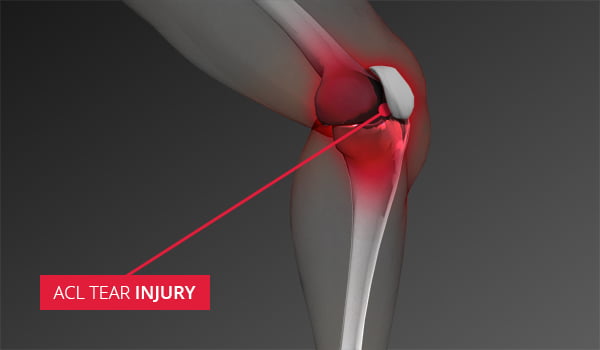
SYMPTOMS OF ACL TEAR
- Swelling that occurs within a few hours. Nearly all patients develop bleeding into their knee joint.
- Pain making a return to prolonged standing or walking. Vigorous activity levels are impossible.
- An audible “pop” is heard with joint motion.
- Inability to bear weight on the injured leg or instability and pain when standing for prolonged periods.
POTENTIAL CAUSES OF ACL TEAR
- Direct impact or collision, such as a fall on a hard surface.
- Changing direction rapidly, or twisting the knee while the foot is planted.
- Stopping suddenly.
- Slowing down while running.
- Landing from a jump incorrectly.
DIAGNOSIS
ACL TEAR TREATMENT OPTIONS
Treatment for an ACL tear will vary depending upon the patient’s individual needs. Less active patients can do well without reconstruction if they participate in rehabilitation and modify their activities. A torn ACL will not heal without surgery. However, nonsurgical treatment may be effective for patients who are elderly or have a very low activity level. In the event your ACL injury is treated non-surgically, your doctor may recommend the use of a knee brace to provide stability to the joint, and physical therapy to restore function to your knee and strengthen the leg muscles that support it. The goal is to return the function of the quadriceps and hamstring muscles to within 90 percent of the other leg.
Active patients who wish to continue to participate in running, cutting, jumping and pivoting sports are excellent candidates for an ACL reconstruction. Most ACL tears cannot be sutured (stitched) back together. To surgically repair the ACL and restore knee stability, the ligament must be reconstructed. Your doctor will replace your torn ligament with a tissue graft. ACL reconstruction (different from “ACL repair”) was developed due to high historical failure rates for ACL repairs. No longer the treatment of choice, ACL repairs in the past involved reattaching the ligament to the bone with staples or other devices.
Most ACL reconstructions are now performed all arthroscopically or arthroscopically-assisted with a small incision of about 3 cm. In these minimally invasive techniques, a graft (piece of tendon) is placed into the knee to replace the torn ACL. The grafts are secured into sockets created in the thigh bone (femur) and shin bone (tibia) in very precise positions. The grafts can be secured with many different types of metal, plastic or bio-absorbable implants to allow for aggressive postoperative rehabilitation. Whether your treatment involves surgery or not, rehabilitation plays a vital role in getting you back to your daily activities. A physical therapy program will help you regain knee strength and motion.
Do you have a knee injury or pain in your knee that might be an ACL Tear? Request an Appointment for a consultation with Sterling Medical Group.
